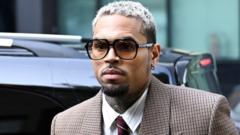The tumultuous political landscape in South Korea experiences another shake-up as former president Yoon Suk Yeol has been rearrested following his controversial martial law bid that stirred national outrage and led to his impeachment.
Yoon Suk Yeol Rearrested Amid Ongoing Martial Law Investigation

Yoon Suk Yeol Rearrested Amid Ongoing Martial Law Investigation
Former South Korean president faces multiple charges including insurrection and evidence tampering after failed martial law attempt.
South Korea's former president Yoon Suk Yeol finds himself once again behind bars, rearrested within an hour of a Seoul District Court's decision due to his involvement in last year’s unsuccessful attempt to impose martial law. This ill-fated endeavor led to significant political unrest and Yoon’s impeachment in April after he briefly instituted military rule in December. The court granted the arrest warrant on the grounds that there is a substantial risk of Yoon destroying crucial evidence related to the case.
During a marathon seven-hour hearing, a special investigation team presented arguments supporting five notable charges against Yoon, including infringing upon the rights of cabinet members by excluding them from a key meeting prior to declaring martial law. Yoon attended the hearing with legal counsel to rebut the allegations but was subsequently taken to the Seoul Detention Center as the court deliberated on the warrant.
This latest arrest marks a dramatic sequel to Yoon’s first apprehension in January, after tense confrontations where law enforcement overcame barricades to detain him at his residence. Although he was released two months later by the court on procedural grounds, Yoon now stands trial facing grave consequences if convicted, including life imprisonment or even the death penalty.
Prosecutors have reportedly uncovered potential evidence indicating that Yoon may have directed military drones to surveil North Korea to incite a response justifying his martial law declaration. Several high-ranking officials are also implicated in the investigation, facing charges of insurrection and abuse of power.
With insurrection charges being one of the few categories from which South Korean presidents cannot seek immunity, Yoon’s fall from grace is a stark reminder of the limits of presidential power, especially now that he is out of office. The country’s current president, Lee Jae-myung, elected after Yoon's impeachment, has committed to repairing the nation’s democratic fabric and has initiated a thorough inquiry into Yoon's martial law actions and other alleged wrongdoings during his presidency. This unfolding saga continues to polarize South Korean society and raises questions about the future stability of its democratic institutions.
During a marathon seven-hour hearing, a special investigation team presented arguments supporting five notable charges against Yoon, including infringing upon the rights of cabinet members by excluding them from a key meeting prior to declaring martial law. Yoon attended the hearing with legal counsel to rebut the allegations but was subsequently taken to the Seoul Detention Center as the court deliberated on the warrant.
This latest arrest marks a dramatic sequel to Yoon’s first apprehension in January, after tense confrontations where law enforcement overcame barricades to detain him at his residence. Although he was released two months later by the court on procedural grounds, Yoon now stands trial facing grave consequences if convicted, including life imprisonment or even the death penalty.
Prosecutors have reportedly uncovered potential evidence indicating that Yoon may have directed military drones to surveil North Korea to incite a response justifying his martial law declaration. Several high-ranking officials are also implicated in the investigation, facing charges of insurrection and abuse of power.
With insurrection charges being one of the few categories from which South Korean presidents cannot seek immunity, Yoon’s fall from grace is a stark reminder of the limits of presidential power, especially now that he is out of office. The country’s current president, Lee Jae-myung, elected after Yoon's impeachment, has committed to repairing the nation’s democratic fabric and has initiated a thorough inquiry into Yoon's martial law actions and other alleged wrongdoings during his presidency. This unfolding saga continues to polarize South Korean society and raises questions about the future stability of its democratic institutions.





















